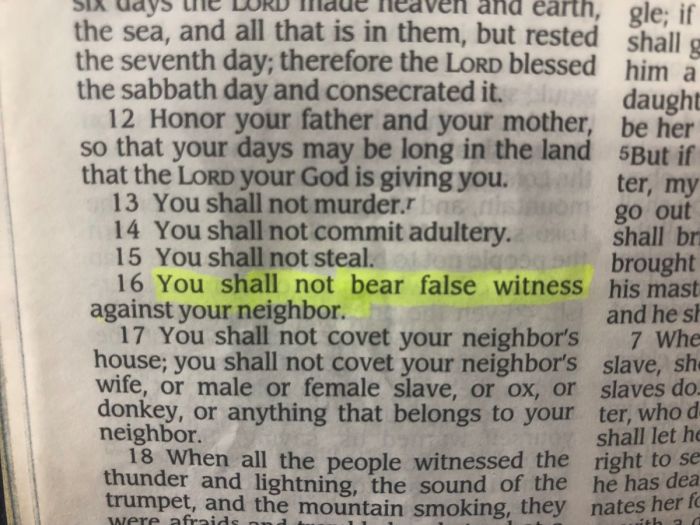Is it ever OK to lie? Pastors and theologians respond

Unacceptable under any circumstance
Brandt Waggoner, the pastor of Fairview Church in Lebanon, Tennessee, a Southern Baptist congregation, said that lying, white lies, deception and withholding the truth are all unacceptable in all cases under any context.
"Honesty is a biblical mandate. All through the scriptures, we see God calling His people to be people of truth, not being deceitful, not speaking lies. … You have this consistent theme of the people of God being people of truth and people who are honest," said Waggoner, who has been the lead pastor of his church location for over five years.
Referring to Ephesians 4:25, Waggoner mentioned how Paul states in the verses: "'put away falsehood. Let each one of you speak truth with his neighbor. For we are members of one another.'"
"I think at the highest level, you have Scripture that says that: 'God is not a person, so He doesn't lie.' And so, at the highest level, when we're talking about God, Scripture confirms that He doesn't lie. But there is this acknowledgment, that for normal people, obviously, there is a reality of lying that we experience," Waggoner said, saying humans still fall short of the glory of God and lie occasionally.
"Jesus is an example of not lying because He was without sin. But clearly, for the average person, lying is something that everyone does at some level."
In Waggoner's perspective, white lies are considered just as "harmful" as any other lie.
When asked what he would do if he was married and his spouse asked him if he ever lusted over anyone else while married to her, Waggoner said that the "truth will set you free from lust."
Waggoner said, "just because someone is telling the truth doesn't mean they are required to give all the details behind the truth."
The truth, he said, does not have to reveal every possible detail because someone can be "simple and truthful and yet not intentionally deceiving their spouse in that instance."
"In Colossians 3:9, Paul says, 'Do not lie to one another. Since you have taken off your old self with its practices.' And so, I think that ties into how we operate naturally, typically to say whatever feels right at the moment. But that should be replaced with answering the call from Scripture to speak truthfully," Waggoner explained.
"I think there are ways to speak the truth with tact. I think there are ways to do that with compassion. Clearly, you can speak the truth in a way that is hurtful, and that is rude. And I think that's clearly problematic. But the call of Scripture most consistently would be, to tell the truth."
Waggoner admits in his pastoral ministry, he occasionally struggles with telling the full truth to congregants because of the pressure that he said exists to please others and to avoid hurting other people's feelings.
"I'm not proud of this. When I do lie, it is usually in an area where I'm not trusting God completely," he said. "Pleasing others can be the most consistent reason for not being completely truthful. It has to do with me having a concern for pleasing people that is greater than a concern for pleasing God."
Waggoner encourages believers to question themselves when they lie: "Why was I not completely truthful?"
"I think it's a very helpful question to consider if I was driven by a desire to please, or was I driven by comfort? I think that has also been another reason why I have resorted to lying. Sometimes, it's just more comfortable to lie than to deal with the difficulties that can come along with just being completely truthful," Waggoner said.
"Jesus says, 'To live in the kingdom of God is to not worry or be anxious about anything.' And He says: 'Because your Father takes care of the flowers and the beauty that they're clothed with.' And He takes care of the birds," Waggoner said, reciting the scriptures that have helped him to be more honest in his pastoral vocation.
"And so there's this view of the kingdom that Jesus gives us, of no reason to worry about anything or to have anxiety about anything. And to me, that's tied to the idea of if I trust God completely as Father, that I don't have to worry about these things, and therefore, I often don't have to lie. I'm able to express my trust in God by telling the truth and ultimately trusting Him to handle the outcomes."
'There's no distinguishing point'
Taylor Drenzyk, a pastor at Edge City Church in Mineola, New York, said he believes honesty is a biblical mandate at all times, regardless of the circumstances.
He said telling white lies and holding back the truth is unacceptable for Christians because "half-truths are no truths at all."
"One way that the devil works is by taking a truth and twisting it or by giving you part of it and then leaving out the rest for you to fill in the blanks. When something is half true, it's not enough. God is holy. There's no imperfection in Him or around Him," Drenzyk explained.
"And therefore, when we talk about the idea of the Truth, like a capital 'T,' absolute; things that are in fact true, they're without any fault or failure. So half-truth is no truth at all. So when we leave things out, that's a half-truth. And it's not complete."
Drenzyk said if faced with Nazi police at his door, he would find another way to protect the people he was sheltering without having to lie.
"If it came down to it, in all honesty, if there were some sort of Nazis knocking at my door, right now in New York, and saying to me, 'hey, you're harboring whomever we want; Jewish people, gypsies, Polish folk,' I would either find a way to have them take me away and kill me or I would buy time so that the Jewish people could escape, without lying," Drenzyk reasoned.
"There's no such thing as a righteous lie. And therefore, all lying is absolute. If the wages of sin is death, and we know lying is a sin, and there's no distinguishing point, then therefore, all lying is sinful."
'Humans are fallen creatures'
But Drenzyk understands that it's impossible for Christians to be honest all the time.
"Humans are fallen creatures ever since Adam and Eve's sin in the garden," he said.
Pointing to Genesis 3, Drenzyk said that one of the very first actions Adam and Eve do is lie by omission, and then the duo passes the blame around about whose fault it was that they bit the fruit.
Drenzyk said that he believes Adam and Eve are examples of the first humans who ever endured consequences for the act of lying. And because of their "grave sin," Drenzyk said, all of their progeny, which makes up humanity, have since struggled with lying for thousands of years.
"I don't think it's possible to be 100% honest, 100% of the time, because we are in fact, 100% fallen creatures. And even though we've been redeemed, and we have the Spirit of God guiding us, there's still a connection to sin. And from time to time, we may find ourselves lying, whether we realize it or not," Drenzyk said.
"We can be lying to ourselves. We could be telling a lie of omission. We can be telling a lie to cover something up. We could be unintentionally lying about something and then realizing later that we lied. There's just so much of a wide berth of what is a lie that I don't think it's possible to be 100% honest 100% of the time. Though, I do think that's what we should be aiming for and that should be our intention. That's how we need to be."
Drenzyk said it's extremely important to him in his ministry work to understand that telling the truth to others is just as important as the way in which truthfulness is expressed.
In the first few years of his ministry work, he said he struggled because of the way in which he shared the truth.
"In those cases, early on in my ministry, I had no problem telling it how it is and putting it out there. And sometimes, my bluntness or my ability to speak the truth and be strong about it was important and it was needed. But there were other times where I felt like maybe I could have been more gentle or maybe I could have had a bit more relationship equity with a person or picked a better environment in order to convey the truth in love," Drenzyk admitted.
Lying can lead to other sins, Drenzyk warned, which can potentially be even more detrimental to a Christian because it can lead to them eventually not being furthered in their sanctification and discipleship, as well as them being distanced from God.
Drenzyk said when he provides direction to someone who confesses a lie to him, he always tries to remind them of God's grace and forgiveness. But, he said, he tries not to "sugarcoat the truth" that lying can lead to unavoidable consequences and sometimes even more sins.
"All sins are forgiven by God. If you believe in Jesus, our sins are 'cast as far as the east is from the west.' And 'there's no condemnation' for us because we're in Christ Jesus; Romans 8:1. But at the same time, there's consequences. So I can come to God and ask for forgiveness if I lie. But sometimes, God's going to allow for a person to sit in the consequence. … We aren't given forgiveness so that sin will abound," Drenzyk noted.
"God did cover Adam and Eve in Genesis 3 with the skins. … And this man from the dirt, who God said 'would surely die,' in that moment, didn't die. God was merciful. And they lived another day and another day. And Adam and Eve lived to be, give or take, 900 years old. And so God, in a sense, forgave them. But the consequences literally damned humanity."
Nicole Alcindor is a reporter for The Christian Post.




























